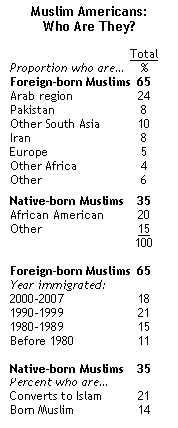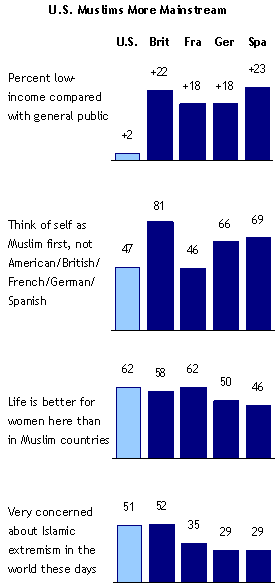Report Summary
The first-ever, nationwide, random sample survey of Muslim Americans finds them to be largely assimilated, happy with their lives, and moderate with respect to many of the issues that have divided Muslims and Westerners around the world.

The Pew Research Center conducted more than 55,000 interviews to obtain a national sample of 1,050 Muslims living in the United States. Interviews were conducted in English, Arabic, Farsi and Urdu. The resulting study, which draws on Pew’s survey research among Muslims around the world, finds that Muslim Americans are a highly diverse population, one largely composed of immigrants. Nonetheless, they are decidedly American in their outlook, values and attitudes. This belief is reflected in Muslim American income and education levels, which generally mirror those of the public.
Key findings include:
- Overall, Muslim Americans have a generally positive view of the larger society. Most say their communities are excellent or good places to live.
- A large majority of Muslim Americans believe that hard work pays off in this society. Fully 71% agree that most people who want to get ahead in the U.S. can make it if they are willing to work hard.
- The survey shows that although many Muslims are relative newcomers to the U.S., they are highly assimilated into American society. On balance, they believe that Muslims coming to the U.S. should try and adopt American customs, rather than trying to remain distinct from the larger society. And by nearly two-to-one (63%-32%) Muslim Americans do not see a conflict between being a devout Muslim and living in a modern society.
- Roughly two-thirds (65%) of adult Muslims in the U.S. were born elsewhere. A relatively large proportion of Muslim immigrants are from Arab countries, but many also come from Pakistan and other South Asian countries. Among native-born Muslims, roughly half are African American (20% of U.S. Muslims overall), many of whom are converts to Islam.

- Based on data from this survey, along with available Census Bureau data on immigrants’ nativity and nationality, the Pew Research Center estimates the total population of Muslims in the United States at 2.35 million.
- Muslim Americans reject Islamic extremism by larger margins than do Muslim minorities in Western European countries. However, there is somewhat more acceptance of Islamic extremism in some segments of the U.S. Muslim public than others. Fewer native-born African American Muslims than others completely condemn al Qaeda. In addition, younger Muslims in the U.S. are much more likely than older Muslim Americans to say that suicide bombing in the defense of Islam can be at least sometimes justified. Nonetheless, absolute levels of support for Islamic extremism among Muslim Americans are quite low, especially when compared with Muslims around the world.
- A majority of Muslim Americans (53%) say it has become more difficult to be a Muslim in the U.S. since the Sept. 11 terrorist attacks. Most also believe that the government “singles out” Muslims for increased surveillance and monitoring.
- Relatively few Muslim Americans believe the U.S.-led war on terror is a sincere effort to reduce terrorism, and many doubt that Arabs were responsible for the 9/11 attacks. Just 40% of Muslim Americans say groups of Arabs carried out those attacks.


